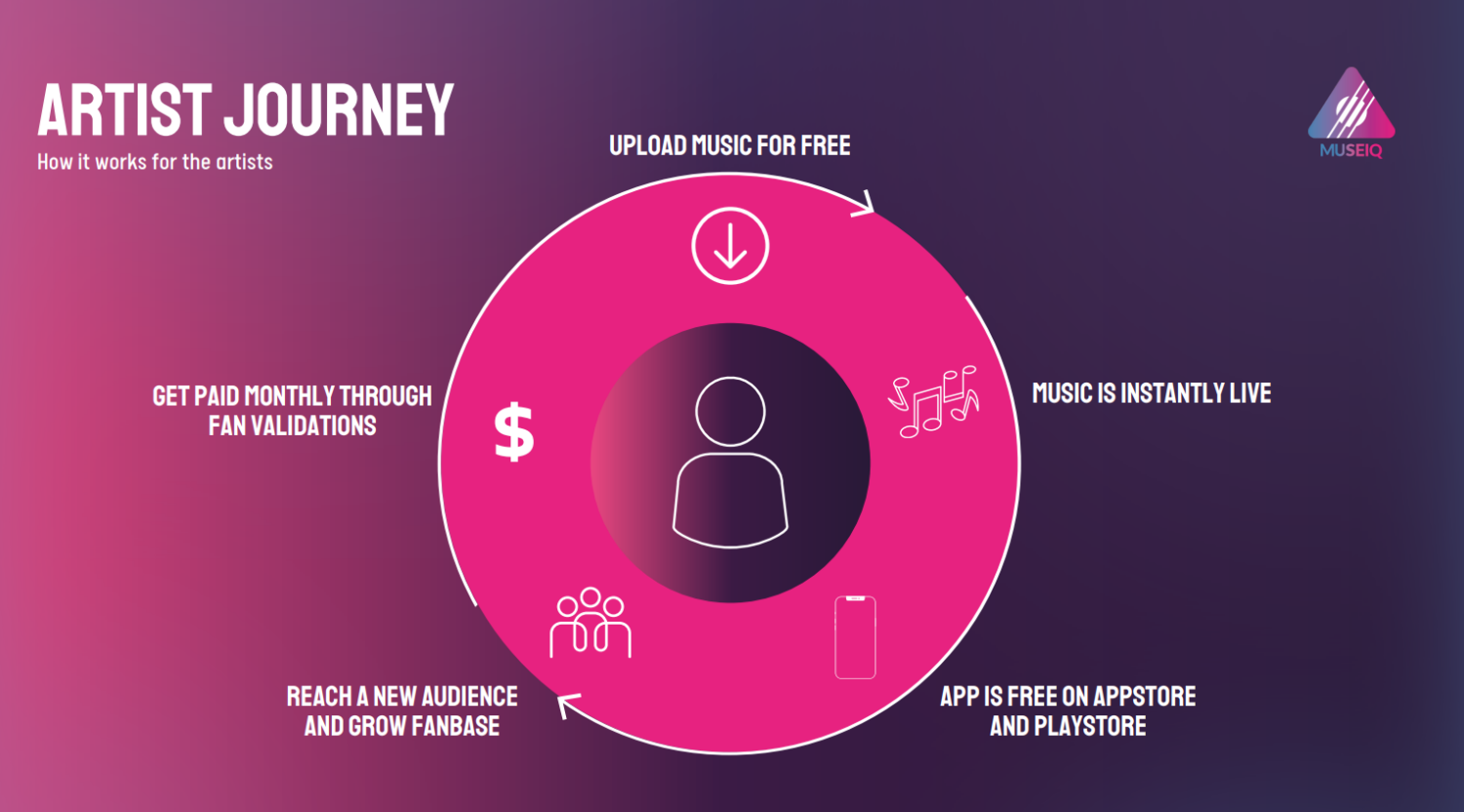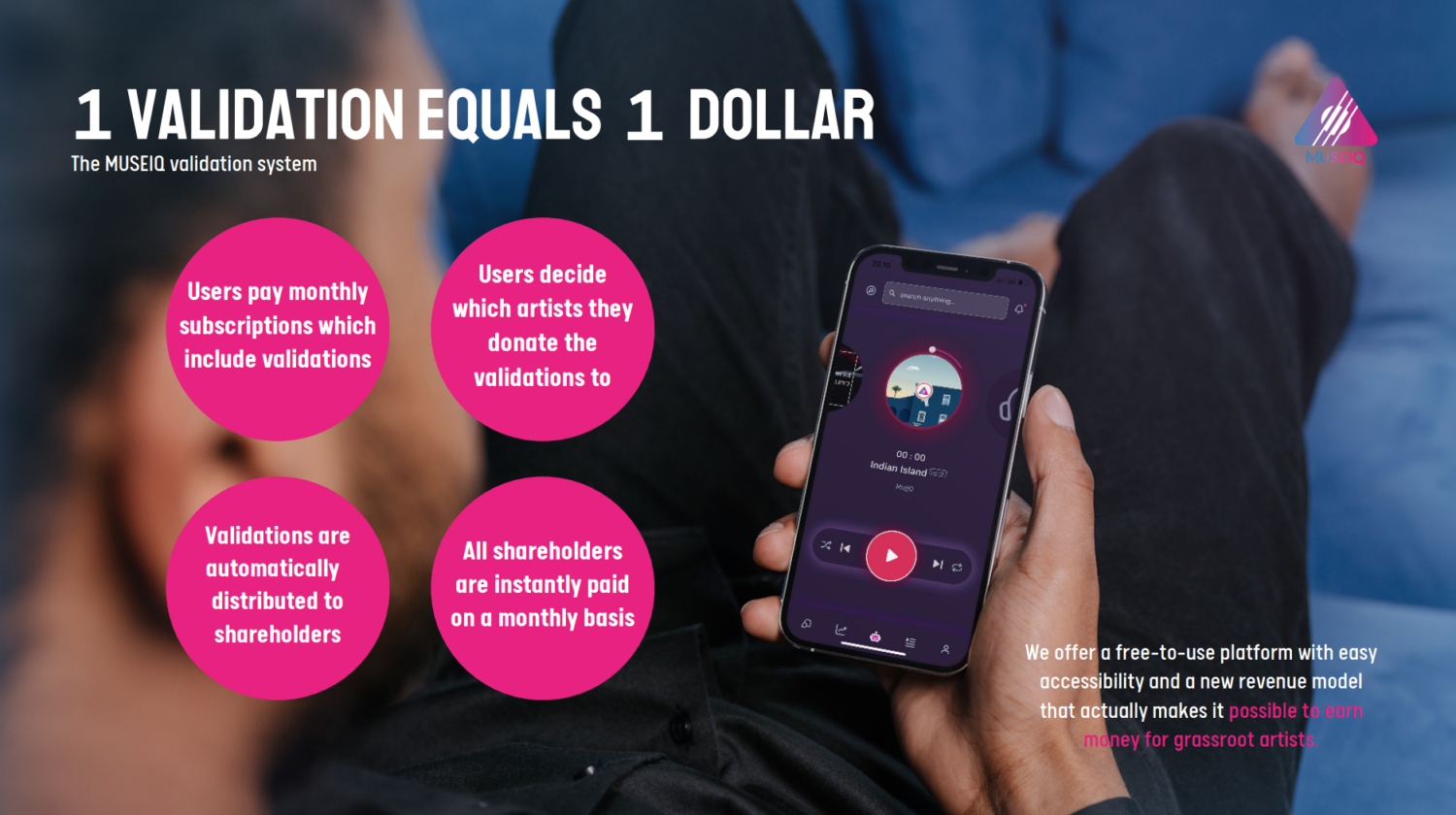MuseIQ wants to be a streaming service
for independent artists
If you're one of those frustrated musicians who spends a lot of time making songs but only receives a pittance from streaming services, you'll probably open your eyes when you read the following:
"MuseIQ, the pioneering music streaming platform, is poised to revolutionise the music industry with its unwavering focus on transparency and fairness."
The promise comes from MuseIQ's press material and the platform went live last autumn.
MuseIQ is now ready to meet users and artists. The ambitions are very high, and the people behind the platform have been working hard for a year and a half to finalise the innovation.
Money from listener to creator
A crucial detail is the so-called "validation system", where paying users have the opportunity to support their favourite names directly. If you sign up for the cheapest subscription (DKK 49 per month), you have one dollar (approximately DKK 7) that can be used for "validation". In other words, you can choose to have the seven kroner go directly to a favourite name that has music on the service.
Paying $89 gets you five dollars for validations, and if you choose the most expensive subscription at $249, you can hand out a whopping $20 to your favourite names.
"This innovative approach ensures that artists are fairly rewarded for their creativity and hard work," reads the press release, which continues: "Unlike other platforms, MuseIQ remains 100 per cent free for all artists. With an easy and intuitive sign up process, artists can quickly get their music on the platform and reach a global audience. MuseIQ offers unlimited uploads, giving artists the freedom to share their creativity without restrictions."

Music geek behind the scenes
Dansk Artist Forbund has spoken to Oscar Stenderup Nielsen, entrepreneur and CEO of MuseIQ. He reports that he has yet to make a single cent from his extensive work to launch the platform.
"We've been working on the idea for over four years. I have two small children and a full-time job on the side. There's a lot of idealism in the business and I've put everything I own and have into it. I'm a huge music nerd and that's the driving force. I'm 38 years old and when I was in my 20s I tried my hand at being a musician, but the talent and persistence didn't last. Instead, I dream of doing something for music. Artists should have a stable income so they can concentrate on what's most important: their talent and desire to make music. We have now reached a point where we have secured investment in the company and put together a strong team," says Oscar Stenderup Nielsen.
He fully recognises that the platform has yet to attract the necessary number of users and artists.
"It's a difficult market where we need both content and fans. It's the old story of the chicken and the egg and what comes first. We're betting that the artists on MuseIQ will drive listeners with them. We're experiencing that now in the start-up phase, and we want to grow on that. The more content, the more users."
"We've just closed an investment round and are doing a marketing campaign. We'll be visible at Spot Festival and hopefully also at Copenhell. We're starting in Denmark and it will be a very exciting journey. We hope to grow organically and connect with those who understand our concept," says Oscar Stenderup Nielsen.
Power to the user
In addition to any validations, music creators with works on the platform also receive payment per stream. How much the CEO can't say specifically due to the complexities of payment, which also depends on whether a song is highly ranked on MuseIQ's charts.
He explains that MuseIQ's share of the user fee varies: 40 per cent from the cheapest subscription, 20 per cent from the medium and 6.5 per cent from the most expensive.
According to Oscar Stenderup, his platform can be an alternative to Spotify, for example.
"Artists who get 1000 streams of a song on Spotify are not making any money. Those artists need to look around the landscape for alternatives, and I hope our business model can be the solution for many."
Do you use a user centric model - a user-centric way of billing?
"I would say that we are the most user-centric platform there is. On other platforms, users don't have much of a say in who gets what for their money. Even if you listen to a lot of up-and-coming names, it's not certain that they actually get anything worth mentioning from the streaming service. We give the power 100 per cent to the user. When you pay for a subscription, you also directly decide who gets the money."

Multiplication of revenue
Is there a correlation between which artists receive the service's validations and which names are listened to?
"There is a connection, but we are still in our infancy, so it's a limited amount of money. We have some American names that have embraced our service. When they brand themselves on social media, they refer to MuseIQ and they also release their music with us first. So they attract fans to our platform because the artists know they can optimise their earnings with us."
"For example, there's a hip-hop artist who after five months has earned 70 dollars with us. He told me that in a whole year he only earned $10 on Spotify. Of course, these are very small amounts. But it still shows that an artist can multiply their earnings on MuseIQ - even though we are only in the start-up phase with few users and artists," says Oscar Stenderup.

Bad with tips
The Danish Artist Association has asked Frederik Juul Jensen to take a look at MuseIQ.
He is a PhD student in music streaming economics at Université Sorbonne Paris Nord.
"To attract users, you need to have a large catalogue of music. And to attract artists and record labels, you need to have a lot of users. So it's hard to start for a streaming platform. Some succeed, others don't," says Frederik Juul Jensen and adds: "MuseIQ offers an alternative solution to the big streaming services. But in every solution there are winners and losers. It's a pool of money that needs to be distributed. Some music acts are extremely good at engaging with fans around a particular service. They can be winners at MuseIQ. Those who are not so good at fan interaction may be the losers. They might be able to earn more on the traditional streaming platforms."
Is this the first time you've heard of a service with "validations"?
"Both - it's certainly a better concept than tipping, which is an option on some services. It doesn't sound positive that artists have to live off "tips" from users who may already be paying a subscription. "Validations" is a good term for how some users can support their favourite artists."
"I also think it's a positive idea that users can voluntarily choose to pay a more expensive subscription in order to support specific artists. The question is just how many hardcore fans out there are willing to pay. In general, consumers' willingness to pay is quite low when it comes to streaming services," says Frederik Juul Jensen.

Possible competitor
Is the business model sustainable?
"It depends on the ambitions: whether it's meant as an alternative to Spotify or if it's more targeted at fans. If users only have to pay 49 kroner a month, it's probably difficult to get the big record labels and music names to move to the service when subscription prices are higher on other platforms."
"Maybe MuseIQ will be more of a competitor to SoundCloud. The latter is also interactive, and it's very much about upcoming artists that can be discovered by very music-interested users. I see MuseIQ as a complement. Not as a platform that will outperform Spotify, for example," says the musicologist.
Back to MuseIQ entrepreneur Oscar Stenderup Nielsen's plans to start a change in the streaming market.
"We want to facilitate "revolution" for independent artists. MuseIQ is an independent company and we want to continue this journey. We want to integrate into the industry, but not subjugate it. We have developed and created our validation system from scratch. There are other companies trying to change the industry, but I don't know of any platforms similar to ours. We have created an ecosystem that provides artists with an alternative revenue stream. We've reached a point where the whole payment structure for streaming has become outdated. It needs an overhaul. Spotify is a great service, but it's also very difficult for them to revise their payout. They can't help upcoming acts in the same way with their current system. This creates a market for a service like ours," says Oscar Stenderup Nielsen from MuseIQ.
Nor is he so "revolutionary" that he wants to take on management companies: "We are in dialogue with Koda, and the ball is currently in their court. We would very much like to have an agreement in place. I hope that Koda will return soon with a proposal, but we are a completely new 'size' to deal with, so it's understandable that it may take a little extra time," says the MuseIQ director.
Read more about MuseIQ and get information about the app here.

